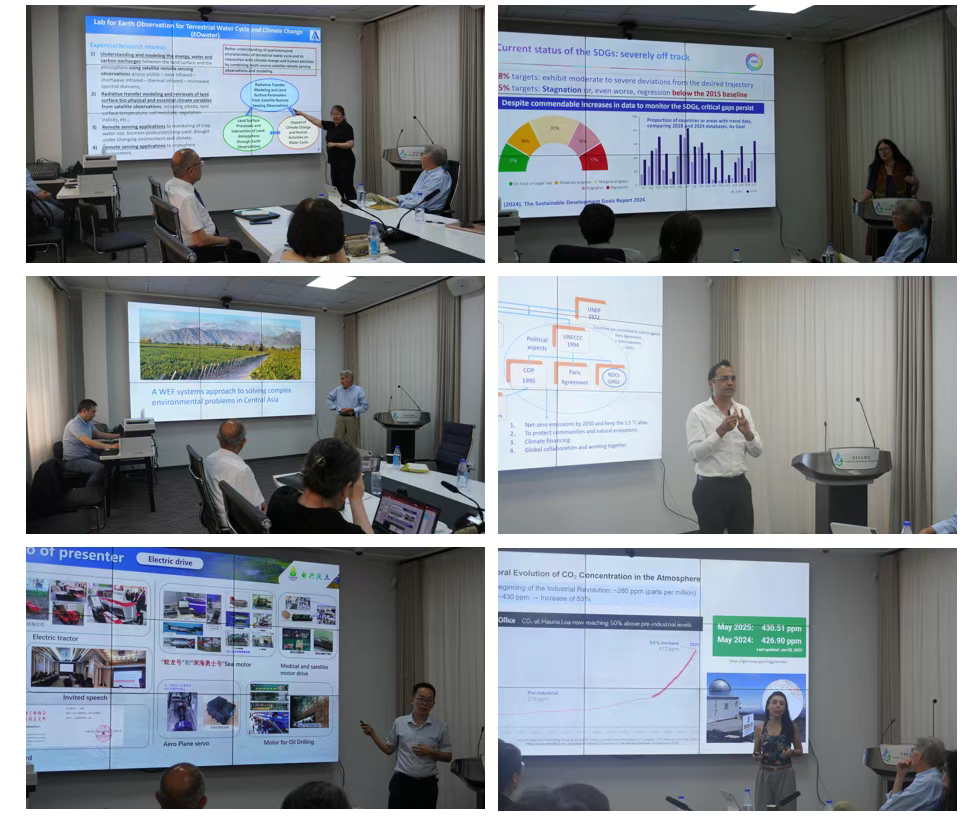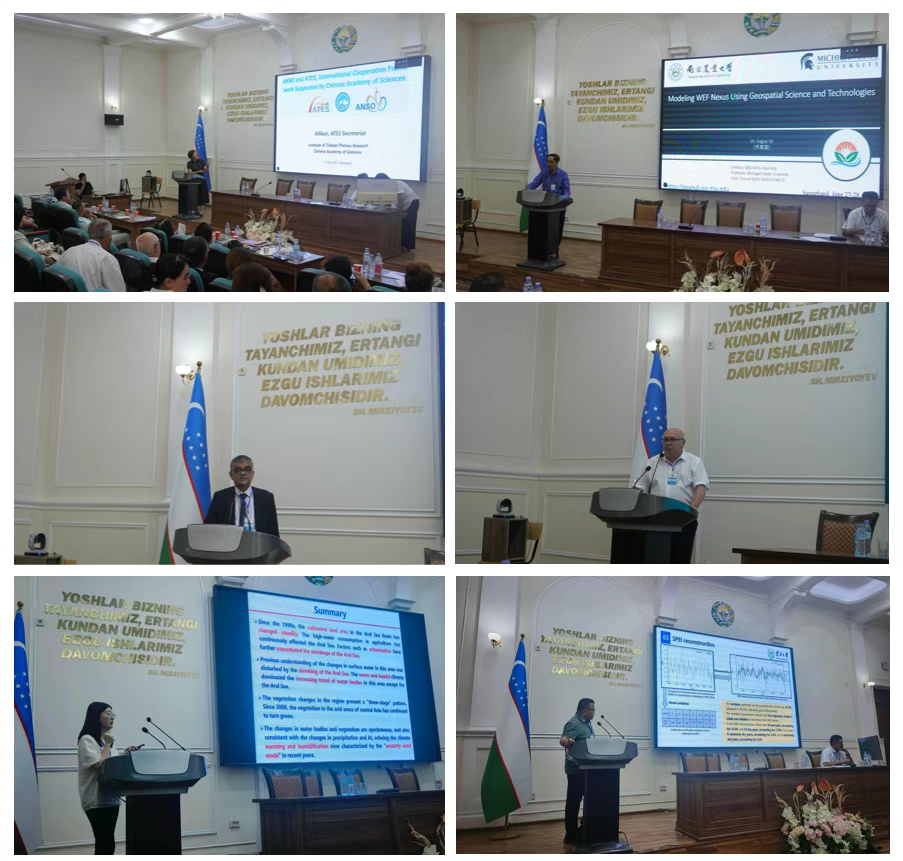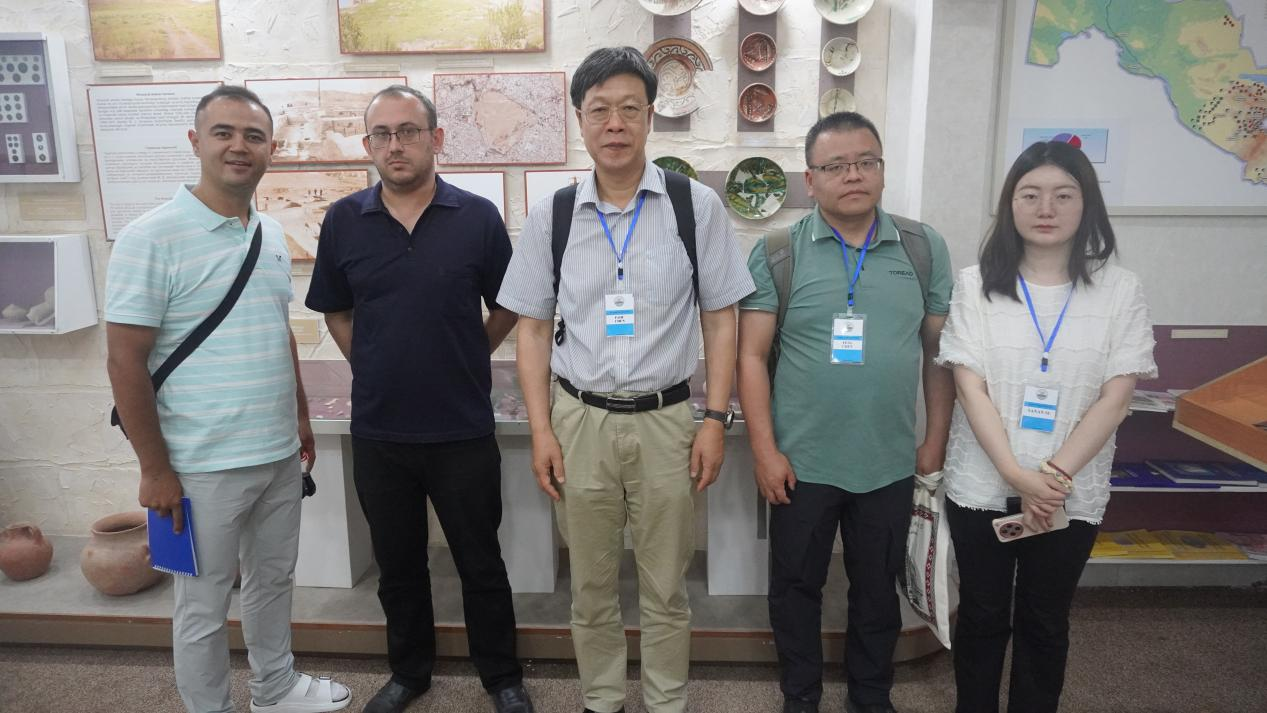From June 24 to 29, 2025, Professor Fahu Chen from the Institute of Tibetan Plateau Research (ITP), Chinese Academy of Sciences (CAS), Co-chair of the Association for Trans-Eurasia Exchange and Silk Road Civilization Development (ATES), visited Uzbekistan by participating in the academic events hosted by the Tashkent Institute of Irrigation and Agricultural Mechanization Engineers (TIIAME) of National Research University (NRU) and Samarkand State University. Furthermore, he engaged in substantive discussions with researchers from Uzbekistan and other Central Asian countries.

Prof. Fahu Chen and the Chinese delegation attended the “WCRP-CORDEX CASCADE Central Asia International Symposium on Climate Change” in Tashkent, co-hosted by TIIAME-NRU, WCRP-CORDEX (World Climate Research Programme - Coordinated Regional Climate Downscaling Experiment), and CASCADE (Central Asia and South Caucasus consortium of Agriculture universities for Development). In his opening remarks, Prof. Chen highlighted Uzbekistan's significance as a key partner in China's Belt and Road Initiative (BRI). He emphasized the critical need to understand the climate change impacts on regional ecosystems, water resources, food security, and socio-economic development in Central Asia and its solutions. Professor Chen presented a keynote talk titled "Climate Change and Past Human-Environment Interactions from Arid Central Asia and Monsoon Asia", providing a comprehensive overview of climate change patterns and mechanisms in arid Central Asia and their relationships with the Asian monsoon. The symposium facilitated the exchange of recent research findings in Central Asia among scientists from Uzbekistan, China, the United States, Canada, Brazil, and others. Discussions focused on future collaborative framework, data and model sharing, and action plans.

Following the Tashkent event, Prof. Fahu Chen participated in the "International Scientific Conference on Ecological and Environmental Protection Issues, Innovative Solutions, and Future Prospects," jointly organized by Samarkand State University, the Ministry of Higher Education, Science, and Innovation of Uzbekistan, and the Ministry of Ecology, Environmental Protection, and Climate Change of Uzbekistan. The conference convened nearly 100 experts and scholars from Uzbekistan, Kazakhstan, Kyrgyzstan, Tajikistan, Turkmenistan, Russia, China, the United States, and Canada. In his opening address, Prof. Chen pointed out Samarkand's historical significance as a pivotal nexus along the ancient Silk Road, facilitating trade, culture, science and technology exchanges between East and West. He delivered a keynote presentation titled "Human along the Silk Road: climate, environment, and human", which detailed recent research findings on early human migration, agriculture origins and early farming, culture and technological diffusion, and the interaction between human and climate/environmental changes along the Silk Road.

Following the Tashkent event, Prof. Fahu Chen participated in the "International Scientific Conference on Ecological and Environmental Protection Issues, Innovative Solutions, and Future Prospects," jointly organized by Samarkand State University, the Ministry of Higher Education, Science, and Innovation of Uzbekistan, and the Ministry of Ecology, Environmental Protection, and Climate Change of Uzbekistan. The conference convened nearly 100 experts and scholars from Uzbekistan, Kazakhstan, Kyrgyzstan, Tajikistan, Turkmenistan, Russia, China, the United States, and Canada. In his opening address, Prof. Chen pointed out Samarkand's historical significance as a pivotal nexus along the ancient Silk Road, facilitating trade, culture, science and technology exchanges between East and West. He delivered a keynote presentation titled "Human along the Silk Road: climate, environment, and human", which detailed recent research findings on early human migration, agriculture origins and early farming, culture and technological diffusion, and the interaction between human and climate/environmental changes along the Silk Road.



Background of the Institutions
Established in 1934, TIIAME National Research University (The Tashkent Institute of Irrigation and Agricultural Mechanization Engineers) is Uzbekistan's premier institution for engineering, agriculture, and environmental sciences. Designated as a national research university by Presidential Decree in 2021, TIIAME has evolved into a regional hub for academic excellence, technological innovation, and global scientific cooperation. With over 100 years of academic legacy, TIIAME plays a vital role in preparing highly qualified professionals and advancing research to address global challenges related to water, food, climate, and sustainability.
CORDEX (Coordinated Regional climate Downscaling Experiment) is a WCRP (World Climate Research Programme) framework to evaluate regional climate model performance through a set of experiments aiming at producing regional climate projections. The CORDEX vision is to advance and coordinate the science and application of regional climate downscaling through global partnerships.
CASCADE (Central Asia and South Caucasus consortium of Agriculture universities for Development) was organized on July 12, 2010 at the founding meeting of 8 universities of the founding countries of the consortium at the "Tashkent Institute of Irrigation and Agricultural Mechanization Engineers" National Research University (TIIAME NRU) in Tashkent. Today CASCADE is proudly announcing the expansion of their university’s partnerships from 8 to 24 members. This growth highlights our commitment to fostering collaboration, innovation, and excellence across the educational landscape in the region.
Samarkand State University was initially established in 1927 under the name of the Higher Pedagogical Institute. In 1930, it became the Uzbekistan State Pedagogical Academy, and in 1933, it was transformed into Uzbekistan State University. During the years 1941-1944, due to World War II, Uzbekistan State University was included in the structure of the Central Asian University. In 1944, Uzbekistan State University was restored. Since 1960, it has been known as Samarkand State University. Currently, Samarkand State University has 7 faculties and 4 institutes, with 59 departments offering 72 educational programs. Approximately 17,000 undergraduate students and over 700 graduate students in 50 master's specializations are studying at the university. They are taught by nearly 900 professors and teachers, including 3 academicians. More than 60 doctoral programs in various specializations are available, with 12 scientific councils conducting defense procedures for these programs.